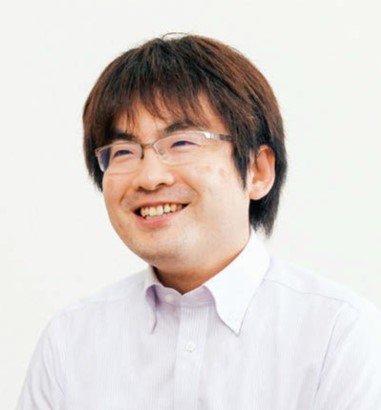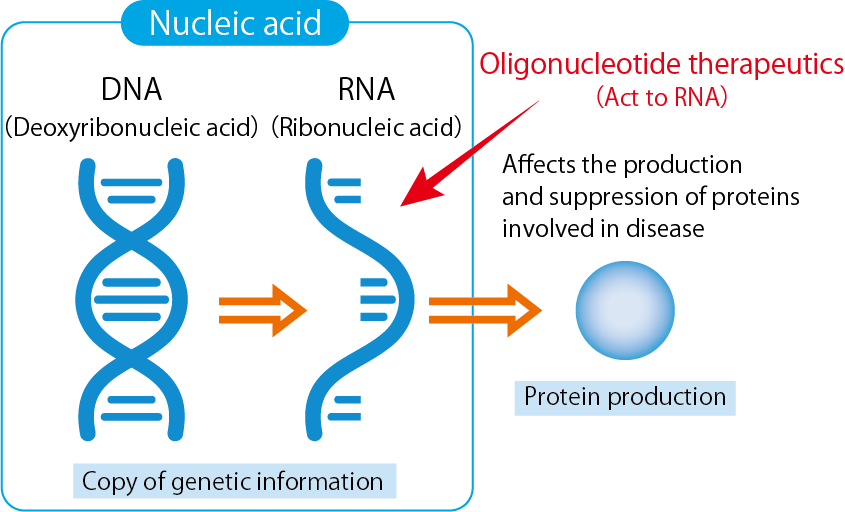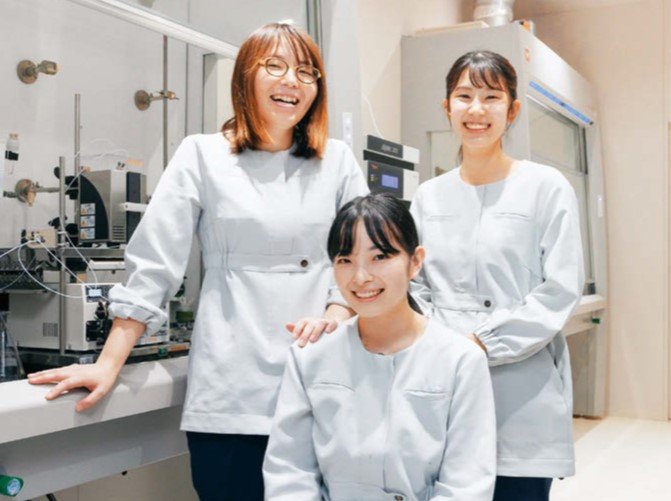Home > Business & Products > Innovation Story > Advanced Materials > Established the industrial manufacturing process for artificial nucleic acid monomer for use in oligonucleotide therapeutics
Interviewed in August 2022
We have established an industrial production process for artificial nucleic acid monomer derived from amino acids, and begun offering them for sale for the first time in the world. These nucleotides can serve as the raw materials for oligonucleotide therapeutics, which are expected to play a role as next-generation medicines. Hereafter, once their safety has been confirmed and they come to be used in oligonucleotide therapeutics, they hold the potential to develop into a major business. We talked to the personnel in-charge of the project, starting with Takahiro Inatsugi, the executive officer in-charge of research and development.
INATSUGI Takahiro
Member of the Board,
Director of Interfacial Science Research Institute

TAKAMURA Masahiko
Group Leader, Advanced Materials Research
Advanced Technology Research Department
Interfacial Science Research Institute

TATSUI Hideyuki
Group Leader, Business Development
Medical Business Promotion Department
Cleaning & Medical Division

 Explanatory diagram of oligonucleotide therapeutics
Explanatory diagram of oligonucleotide therapeuticsOligonucleotide therapeutics is the general term used for pharmaceuticals utilizing amino acids, which govern genetic information such as DNA and RNA. This approach acts directly on the genes which cause illness. There are high hopes that they can be used to treat genetic disorders and rare diseases which have hitherto been difficult to treat.
However, only five oligonucleotide therapeutics have so far been approved in Japan, out of a total of just 16 worldwide. COVID-19 vaccines are a familiar example of such drugs which have been put into practical use, but issues still remain concerning their use as therapeutics.
One of the challenges to the widespread adoption of these medicines are the nucleic acid monomer (*1) which are their raw materials. Oligomers (*2) composed of naturally-derived nucleic acid monomer have the disadvantage of being unstable and decomposing easily within the body. This makes it hard for them to reach their target genes. Various methods are being pursued to overcome these challenges, but researchers have yet to arrive at an overall solution. In addition, oligonucleotide composed of synthetic monomers tend to place a burden on the body, among other issues.
To solve these kinds of problems, a research team led by Professor Hiroyuki Asanuma, of the Nagoya University Graduate School of Engineering, developed artificial nucleic acid derived from amino acids.
While existing artificial amino acid structures use sugars as their primary backbone, these new nucleic acid monomer use amino acids for their primary backbone, making them resistant to decomposition within the body and placing a smaller burden on it. These remarkable characteristics of high stability and safety within the body are becoming clear, and expectations are high that these nucleotides can be applied in revolutionary medicines.
Nevertheless, only a limited amount of these artificial nucleic acid monomer can be synthesized in University laboratories. This makes it a challenge to adequately support research into their efficacy and safety for use in drug development. Therefore, we used the Japan Science and Technology Agency (JST) Adaptable and Seamless Technology transfer Program through target-driven R&D (A-STEP) to team up with Nagoya University and Hokkaido System Science Co. Ltd. (who collaborated with us on the CNV Series in 2016), and begin joint development aimed at establishing an industrial manufacturing process for these nucleotides.
 Advanced Materials Research Group members involved in the development
Advanced Materials Research Group members involved in the developmentThe precision organic synthesis technology that we have built up since our founding through activities such as the manufacture of surfactants, has helped towards establishing an industrial manufacturing process.
As we worked to reduce costs and achieve high quality, we also strove to increase safety and reduce environmental impacts during their manufacture. To this end, we reviewed the synthesis method used at the university, and established our own manufacturing method. (Takamura) As a result, yield, which is the standard measure of efficiency, increased approximately ten-fold, from a few percent to a few dozen percent. The amount of monomers that can be gained from a single synthesis increased from 1 g to 50 g. This greatly reduces cost.
At present, we are the only company in the world that sells these artificial nucleic acid monomer.
In addition, this initiative has been selected for the Science and Technology Platform Program for Advanced Biological Medicine run by the Japanese Government's Japan Agency for Medical Research and Development (AMED). The research team for which Professor Asanuma serves as R&D Representative, is moving forward with experimental research and various evaluations aimed at tackling the important issues of ensuring safety and applying oligonucleotide therapeutics.
If safety can be ensured, then they will go into clinical trials, and we will begin to see the possibility of oligonucleotide therapeutics using artificial nucleic acid monomer that are manufactured by our company being put into practical use. If this happens, there is a possibility that it will develop into a major business.
This initiative is a good example of embodying the motto we have followed since our founding, "Creating Value by Providing Technology". (Tatsui) You could say the fruits of this open innovation initiative has been getting us to draw on the full resources of the company and proactively engage in solving the challenge of mass producing nucleic acid monomer together with our business partners, while also creating a new engine for growth.
"Bringing about oligonucleotide therapeutics which can help people who could not be treated with existing medicine is an extremely significant contribution to society, and deeply meaningful." (Inatsugi)
We are focusing our efforts on Environmental, Health, and Digital (EHD) business, as laid out in our medium-term business plan. And, going forward, we will treat the health sector as a new pillar of our business, and contribute to the development of medical treatment by engaging in research and development of artificial nucleic acid monomer.
(※1)Nucleic acid monomer
the smallest components of nucleic acids
(※2)Oligomers
A polymer chain of a few to around 100 nucleic acids
(※3)CNV Series
Artificial nucleic acid monomer used as agents in genetic analysis for examining the risk of conditions such as cancer (Link to Japanese site)

COPYRIGHT © NICCA CHEMICAL CO.,LTD. ALL RIGHTS RESERVED.